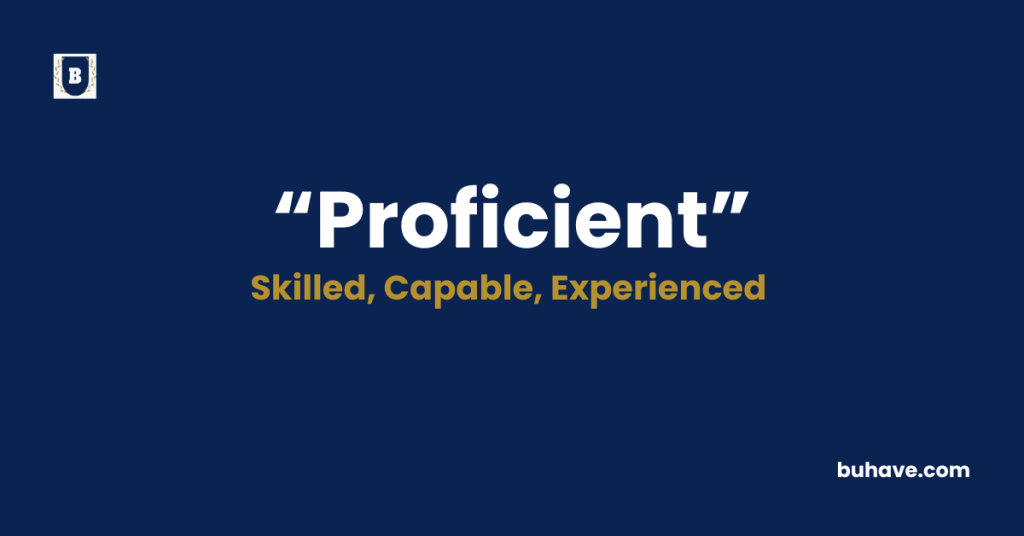The word ‘Proficient’ (Adjective) describes someone who is skilled, competent, or well-versed in a particular activity, subject, or task. In this guide, you’ll learn the full definition, synonyms, antonyms, etymology, and real-life examples of how to use ‘Proficient’ correctly in sentences.
Proficient Explained in Depth
A complete and detailed guide to the word Proficient including meaning, definition, examples, etymology, synonyms, and antonyms.
Meanings of Proficient
The word proficient is used to describe a person who has a high level of skill or competence in a particular area, field, or subject. Being proficient means not just being familiar with something, but being able to perform it efficiently and effectively, often with a level of mastery that goes beyond basic understanding. This term is frequently used in educational, professional, and technical contexts to denote capability and expertise—such as being proficient in a language, computer programming, writing, or a specific job role.
Proficiency involves more than just rote knowledge; it includes the ability to apply skills practically, solve problems, and produce high-quality outcomes consistently. For example, a proficient musician doesn’t just read notes they interpret and perform music fluently. Similarly, a proficient speaker of a foreign language can converse with ease, understanding cultural nuances and complex grammar.
This word also implies consistent improvement, as someone who is proficient typically continues to refine and sharpen their skills over time. In this sense, proficiency is closely tied to discipline, experience, and an active pursuit of excellence.
Definition
Proficient is defined as being competent or skilled in doing or using something. It signifies a strong command or mastery of a particular ability, often resulting from learning, practice, and experience. Someone who is proficient is not only knowledgeable but also capable of applying that knowledge effectively in real-world situations.
In various professional and academic environments, being proficient implies a level of autonomy and confidence in one’s performance. Similarly, a student who is proficient in mathematics understands core concepts and can apply them to new problems confidently.
Therefore, proficiency is a valuable trait that reflects reliability, expertise, and a high standard of performance. It helps distinguish individuals who are merely learning from those who are capable of producing meaningful, consistent results through their skills.
Etymology
The etymology of the word “proficient” reveals its origins in Latin and highlights its long-standing association with progress and expertise. The word has developed through several linguistic stages before taking its modern form in English:
- Latin: The root word is proficere, which means “to progress,” “to advance,” or “to be useful.” It is formed from the prefix pro- meaning “forward” and facere meaning “to do” or “to make.” Together, proficere literally means “to make progress” or “to move forward in doing.”
- Late Latin: From proficientem (present participle), meaning “advancing” or “making progress.”
- Middle French: The word evolved into Middle French as proficient, meaning “capable” or “adept.”
- Middle English: It entered English in the 15th century with the same meaning—someone who has advanced knowledge or skills in a particular area.
This historical development reflects the core idea that a proficient person is someone who has advanced in learning or ability through effort and application. The Latin root facere (to do) also implies action, not just understanding, further emphasizing that proficiency involves effective execution. Over time, the word has maintained this association with practical skill, measurable progress, and applied knowledge, which remains central to how we understand and use “proficient” today.
Example Sentences
- She is highly proficient in three languages and can switch between them with ease.
- The technician was proficient in handling complex machinery without any supervision.
- Becoming proficient in coding takes time, patience, and a lot of practice.
- Her proficient writing style earned her a position at a top publishing firm.
- The athlete became proficient in multiple sports before deciding to specialize in tennis.
Proficient Synonyms
- Skilled
- Competent
- Adept
- Capable
- Experienced
- Expert
- Efficient
- Well-versed
- Qualified
- Trained
Proficient Antonyms
- Inept
- Incompetent
- Unskilled
- Inexperienced
- Unqualified
- Clumsy
- Amateurish
- Ignorant
- Novice
- Incapable
FAQs about Proficient
Here are some frequently asked questions (FAQs) about the word “Proficient”
1. What does “proficient” mean in simple terms?
“Proficient” means being good at something because of skill, training, or experience.
2. How can someone become proficient?
Through consistent learning, practice, experience, and feedback.
3. Is “proficient” a formal word?
Yes, it is commonly used in professional and academic settings, especially in résumés and evaluations.
4. Can you use “proficient” in a resume?
Absolutely. It’s ideal for listing technical skills, language abilities, and job-related competencies.
Explore more p words
Positive words that start with P
Negative words that start with P
Names that start with P
Nouns that start with P

















